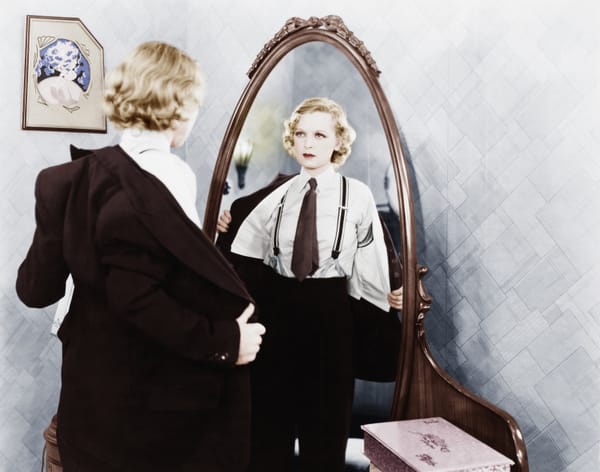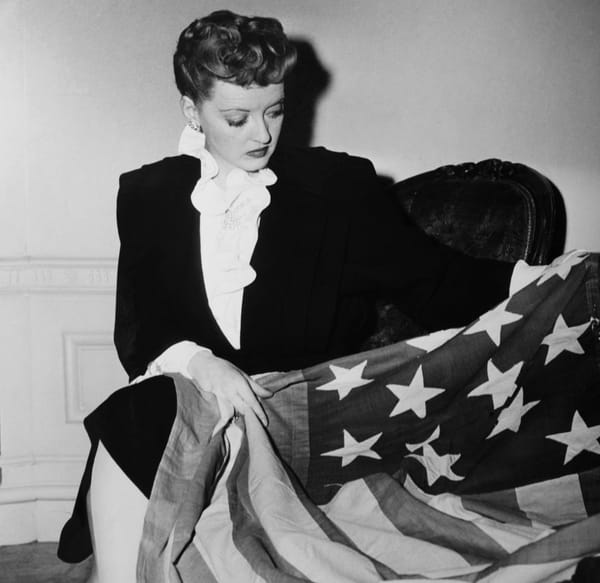Why I’m Saying Yes to (Some) Unpaid Labor
Resisting unpaid labor is a feminist move. In the real world, it’s complicated.

Once upon a time, a mom from Nebraska with a Ph.D. in anthropology and three kids, spoke about getting ready in the morning. Here is what she said:
“I wash the [breakfast] dishes, rush the older children off to school, dash out in[to] the yard to cultivate the chrysanthemums, run back in[side] to make a phone call about a committee meeting, help the youngest child build a blockhouse, spend 15 minutes skimming the newspapers so I can be well-informed, then scamper down to the washing machines, where my thrice-weekly laundry includes enough clothes to keep a primitive village going for an entire year…By noon I’m ready for a padded cell [...] yet I look upon myself as one of the more relaxed housewives in the neighborhood.”
Sound familiar?
Now, what if I told you that the woman in question was speaking more than 60 years ago to Betty Friedan, who, at the time, was writing her seminal book, The Feminine Mystique.
What this mother said could easily pass as a desperate diatribe uttered today by a frazzled mom, exhausted from the relentless Tetris game of everyday life, and the perennially-under-appreciated work of ensuring her household doesn’t cataclysmically implode.
Over the past hundred years, global temperatures have risen, empires have fallen, flared jeans have come into, and gone out of, and then come back into fashion, but one thing hasn’t changed: The burden of day-to-day unpaid labor still falls mostly on the shoulders of women. That is as true in 2024 as it ever was, even as more women than ever outearn men in the paid labor market.
Sure, in an ideal world it would take just one well-coordinated unpaid labor strike to level the gender playing field. But in my world? Here? Now? Today? Not ideal.
It’s no wonder that a frustration-fuelled movement (spearheaded by people like Eve Rodsky) has, in recent years, gathered pace calling on society to acknowledge the price of unpaid labor and its painful, unequal distribution.
Taking a stand against this entrenched imbalance has rightly been lauded as a brave, principled and necessary act of feminism—but it’s also not that easy. Sure, in an ideal world it would take just one well-coordinated unpaid labor strike—one synchronized act of idle resistance—to level the gender playing field. Iceland did it, after all. But in my world? Here? Now? Today? Not ideal. And the cost of saying no? Well, it’s complicated.
Emotional Toil
Unpaid labor comes in all shapes and sizes, not to mention in all guises.
Beyond the obvious like childcare and housework, there is cognitive labor: decisions upon decisions about everything from “what’s for dinner?” to “does this toothpaste contain forever chemicals?” and “what time do we have to leave for school?” These might sound like small decisions—indeed they are—but they add up. The cognitive load can be crippling, straining everything from marriages to friendships and heart health to sleep.
I asked my friend Maude, a London-based mother of three, who works a full-time job in finance, to sum up some of the unpaid labor she does every week. Much of it is physical but a huge amount is emotional, she said.
“Closet-sorting, holiday-packing, playdate-booking, uniform-ordering, responding to school calls, tracking passport expiry dates and immunization schedules, tracking birthday parties, coordinating with grandparents and general household logistics: who’s where when,” she said, breathlessly.
And there’s more:
“Costume making for dinosaur day and Roman day and space day and Victorian and day and minibeast day (yes those are all real) and secretly throwing away party bags full of slime,” she continued before I had to ask her to, “please stop.” I was feeling anxious just listening to her.
Other mothers I have asked, just bark an exasperated laugh at the ridiculousness of my question. “How long have you got?” is a common response. Or: “What do you mean all of it?” Holly, a Brooklyn-based journalist and relatively new mother, offered up perhaps the ultimate example of unpaid labor that is as emotional as it is physical: breastfeeding.
“I lugged a mechanical breast pump to the White House Correspondents’ dinner in Washington D.C. so that I could pump and dump and not get mastitis,” she said. “I have a friend who enjoyed breastfeeding but stopped after four months when she went back to work,” Holly added. “She said she refused to do two jobs at the same time. And honestly, I respect that.”
The thing is, when you start looking, you see unpaid labor everywhere—and not just in the home. Mothers who earn money in the labor market regaled me with stories of office admin that goes way beyond the bounds of their job description.
“It’s always me who organizes any sort of team social,” said one. Another said she finds herself mentoring more workers than any of her male colleagues—a task she enjoys, but that saps time and energy. “One guy in the office calls me the team’s ‘work-mom,’” she said. “He thinks it’s hilarious. It makes me want to punch him.”
“One guy in the office calls me the team’s ‘work-mom.’ He thinks it’s hilarious. It makes me want to punch him.”
“A lot of women entering workplaces that were previously male dominated are finding that they are expected, by virtue of being women, to provide an added shift of emotional labor," Rose Hackman told the journalist Kate Morgan in a BBC article. The result is that women end up doing much more of the “office housework,” as Morgan calls it.
I suppose office housework might just about fall under the rubric of “doing one’s job,” but in my opinion, the most audacious thing is an explicit request to work for free. I’ll explain.
As a freelance journalist, I’m often asked to do speaking gigs that offer no dollars but “great exposure” or I’m given writing assignments that may increase my visibility, but don’t come with a fee. Last I checked, visibility has never paid the rent on time. And exposure? “That shit kills,” a veteran freelance journalist once told me. “Don’t do it.”
And so, at the start of 2024, rather than setting myself a new year’s resolution, I made myself a new year’s promise: I’d only do unpaid labor that was absolutely necessary or that I truly wanted to do. Have I succeeded? You judge.
Childcare was non-negotiable. My husband works in a full-time office-based job. I don’t. By mutual agreement I’m the school dropper off and picker up. Other chores around the house we split in a way that makes sense for us. During the week, I tend to cook; he tends to do the laundry. (Apropos of this, read The Persistent’s Emma Haslett on walking out of the kitchen.)
I realized after I made that promise to myself, that I don’t even really think of these types of tasks as unpaid labor, just the necessary price of being a responsible adult, and a responsible parent. And that actually made me feel better about it. After all, research has shown that if American women earned minimum wage for the unpaid work they do around the house and caring for relatives, they would make about $1.5 trillion a year.
I also realized that I’m not prepared to deal with the pushback of trying to resist this work; of what would be the inevitable familial stress and discombobulation of upended routines if I did. For my household, it makes no financial sense to hire help, and I want to be very present for my child. So yes, the unpaid labor is necessary.
But then things get murkier; there are choices that are less clear cut. Could I speak to a friend’s kid who’d just graduated and wants to pursue a career in journalism? Could I glance over a friend’s job application? Could I host a pro bono book talk on the occasion of a large corporation’s Women History Month celebration?
Say no and forgo those extra sales and all-important word-of-mouth recommendations. Or worse, run the risk of hurting a friend.
Say yes, and reach new readers for my book and preserve a friendship. And the truth is, sometimes those yesses that feel like a drag in the moment can end up bringing in a far greater return. A panel I moderated gratis caused me to cross paths with someone who ended up hooking me up with enough freelance work to feed our family for months. An article I once wrote for free led to a connection that yielded a speaking gig that netted me $1,500. Was that really unpaid labor? Strictly yes, but $1,500 certainly helps pay the rent. We may live by the rules of capitalism, but favors and goodwill are a currency that shows no sign of devaluing.
A Full Sentence
We’re now more than halfway through the year. In terms of the annual earnings goals I’ve been ceremoniously setting myself since going freelance six years ago, I’m on track. In terms of the income I’ve forfeited because of relationships or manners or social norms or conventions? I don’t know and I’d prefer to keep it that way. In terms of my mental health? I may not look upon myself as one of the most relaxed “housewives” in the neighborhood, but I’m not ready for a padded cell quite yet either.
When I first began working for myself, an acquaintance with a shiny job in media relations asked what I was billing a client for a particular commission. When I told him, he didn’t miss a beat: “Add a zero,” he implored.
I’ve yet to muster the courage to follow that advice, but there are some principles I have managed to stick to:
- If I feel undervalued, I demand more.
- If I don’t know what’s in it for me, I ask.
- If I don’t like the response, I don’t take it.
- And if all else fails? No is a full sentence.
At that point, I take a deep breath and move on.
Believe me, there will be plenty more unpaid work waiting for me at home and at least I get to wear pajamas while doing it.
Josie Cox is a journalist, author, broadcaster and public speaker. Her book, “WOMEN MONEY POWER: The Rise and Fall of Economic Equality,” was released in March.
More from The Persistent
The Day I Walked Out of The Kitchen
Sleep Is Different for Women Than for Men, and No, It’s Not Women’s Fault.





